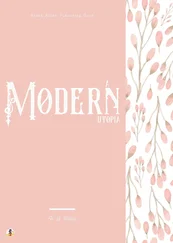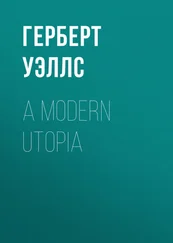Herbert Wells - A Modern Utopia
Здесь есть возможность читать онлайн «Herbert Wells - A Modern Utopia» весь текст электронной книги совершенно бесплатно (целиком полную версию без сокращений). В некоторых случаях можно слушать аудио, скачать через торрент в формате fb2 и присутствует краткое содержание. Жанр: Социально-психологическая фантастика, на английском языке. Описание произведения, (предисловие) а так же отзывы посетителей доступны на портале библиотеки ЛибКат.
- Название:A Modern Utopia
- Автор:
- Жанр:
- Год:неизвестен
- ISBN:нет данных
- Рейтинг книги:4 / 5. Голосов: 1
-
Избранное:Добавить в избранное
- Отзывы:
-
Ваша оценка:
- 80
- 1
- 2
- 3
- 4
- 5
A Modern Utopia: краткое содержание, описание и аннотация
Предлагаем к чтению аннотацию, описание, краткое содержание или предисловие (зависит от того, что написал сам автор книги «A Modern Utopia»). Если вы не нашли необходимую информацию о книге — напишите в комментариях, мы постараемся отыскать её.
A Modern Utopia — читать онлайн бесплатно полную книгу (весь текст) целиком
Ниже представлен текст книги, разбитый по страницам. Система сохранения места последней прочитанной страницы, позволяет с удобством читать онлайн бесплатно книгу «A Modern Utopia», без необходимости каждый раз заново искать на чём Вы остановились. Поставьте закладку, и сможете в любой момент перейти на страницу, на которой закончили чтение.
Интервал:
Закладка:
§ 6
This talk of languages, however, is a digression. We were on our way along the faint path that runs round the rim of the Lake of Lucendro, and we were just upon the point of coming upon our first Utopian man. He was, I said, no Swiss. Yet he would have been a Swiss on mother Earth, and here he would have the same face, with some difference, maybe, in the expression; the same physique, though a little better developed, perhaps—the same complexion. He would have different habits, different traditions, different knowledge, different ideas, different clothing, and different appliances, but, except for all that, he would be the same man. We very distinctly provided at the outset that the modern Utopia must have people inherently the same as those in the world.
There is more, perhaps, in that than appears at the first suggestion.
That proposition gives one characteristic difference between a modern Utopia and almost all its predecessors. It is to be a world Utopia, we have agreed, no less; and so we must needs face the fact that we are to have differences of race. Even the lower class of Plato's Republic was not specifically of different race. But this is a Utopia as wide as Christian charity, and white and black, brown, red and yellow, all tints of skin, all types of body and character, will be there. How we are to adjust their differences is a master question, and the matter is not even to be opened in this chapter. It will need a whole chapter even to glance at its issues. But here we underline that stipulation; every race of this planet earth is to be found in the strictest parallelism there, in numbers the same—only, as I say, with an entirely different set of traditions, ideals, ideas, and purposes, and so moving under those different skies to an altogether different destiny.
There follows a curious development of this to anyone clearly impressed by the uniqueness and the unique significance of individualities. Races are no hard and fast things, no crowd of identically similar persons, but massed sub-races, and tribes and families, each after its kind unique, and these again are clusterings of still smaller uniques and so down to each several person. So that our first convention works out to this, that not only is every earthly mountain, river, plant, and beast in that parallel planet beyond Sirius also, but every man, woman, and child alive has a Utopian parallel. From now onward, of course, the fates of these two planets will diverge, men will die here whom wisdom will save there, and perhaps conversely here we shall save men; children will be born to them and not to us, to us and not to them, but this, this moment of reading, is the starting moment, and for the first and last occasion the populations of our planets are abreast.
We must in these days make some such supposition. The alternative is a Utopia of dolls in the likeness of angels—imaginary laws to fit incredible people, an unattractive undertaking.
For example, we must assume there is a man such as I might have been, better informed, better disciplined, better employed, thinner and more active—and I wonder what he is doing!—and you, Sir or Madam, are in duplicate also, and all the men and women that you know and I. I doubt if we shall meet our doubles, or if it would be pleasant for us to do so; but as we come down from these lonely mountains to the roads and houses and living places of the Utopian world-state, we shall certainly find, here and there, faces that will remind us singularly of those who have lived under our eyes.
There are some you never wish to meet again, you say, and some, I gather, you do. “And One―!”
It is strange, but this figure of the botanist will not keep in place. It sprang up between us, dear reader, as a passing illustrative invention. I do not know what put him into my head, and for the moment, it fell in with my humour for a space to foist the man's personality upon you as yours and call you scientific—that most abusive word. But here he is, indisputably, with me in Utopia, and lapsing from our high speculative theme into halting but intimate confidences. He declares he has not come to Utopia to meet again with his sorrows.
What sorrows?
I protest, even warmly, that neither he nor his sorrows were in my intention.
He is a man, I should think, of thirty-nine, a man whose life has been neither tragedy nor a joyous adventure, a man with one of those faces that have gained interest rather than force or nobility from their commerce with life. He is something refined, with some knowledge, perhaps, of the minor pains and all the civil self-controls; he has read more than he has suffered, and suffered rather than done. He regards me with his blue-grey eye, from which all interest in this Utopia has faded.
“It is a trouble,” he says, “that has come into my life only for a month or so—at least acutely again. I thought it was all over. There was someone―”
It is an amazing story to hear upon a mountain crest in Utopia, this Hampstead affair, this story of a Frognal heart. “Frognal,” he says, is the place where they met, and it summons to my memory the word on a board at the corner of a flint-dressed new road, an estate development road, with a vista of villas up a hill. He had known her before he got his professorship, and neither her “people” nor his—he speaks that detestable middle-class dialect in which aunts and things with money and the right of intervention are called “people”!—approved of the affair. “She was, I think, rather easily swayed,” he says. “But that's not fair to her, perhaps. She thought too much of others. If they seemed distressed, or if they seemed to think a course right―” ...
Have I come to Utopia to hear this sort of thing?
§ 7
It is necessary to turn the botanist's thoughts into a worthier channel. It is necessary to override these modest regrets, this intrusive, petty love story. Does he realise this is indeed Utopia? Turn your mind, I insist, to this Utopia of mine, and leave these earthly troubles to their proper planet. Do you realise just where the propositions necessary to a modern Utopia are taking us? Everyone on earth will have to be here;—themselves, but with a difference. Somewhere here in this world is, for example, Mr. Chamberlain, and the King is here (no doubt incognito ), and all the Royal Academy, and Sandow, and Mr. Arnold White.
But these famous names do not appeal to him.
My mind goes from this prominent and typical personage to that, and for a time I forget my companion. I am distracted by the curious side issues this general proposition trails after it. There will be so-and-so, and so-and-so. The name and figure of Mr. Roosevelt jerks into focus, and obliterates an attempt to acclimatise the Emperor of the Germans. What, for instance, will Utopia do with Mr. Roosevelt? There drifts across my inner vision the image of a strenuous struggle with Utopian constables, the voice that has thrilled terrestrial millions in eloquent protest. The writ of arrest, drifting loose in the conflict, comes to my feet; I impale the scrap of paper, and read—but can it be?—“attempted disorganisation?... incitements to disarrange?... the balance of population?”
The trend of my logic for once has led us into a facetious alley. One might indeed keep in this key, and write an agreeable little Utopia, that like the holy families of the mediæval artists (or Michael Angelo's Last Judgement) should compliment one's friends in various degrees. Or one might embark upon a speculative treatment of the entire Almanach de Gotha , something on the lines of Epistemon's vision of the damned great, when
“Xerxes was a crier of mustard.
Romulus was a salter and a patcher of patterns....”
Интервал:
Закладка:
Похожие книги на «A Modern Utopia»
Представляем Вашему вниманию похожие книги на «A Modern Utopia» списком для выбора. Мы отобрали схожую по названию и смыслу литературу в надежде предоставить читателям больше вариантов отыскать новые, интересные, ещё непрочитанные произведения.
Обсуждение, отзывы о книге «A Modern Utopia» и просто собственные мнения читателей. Оставьте ваши комментарии, напишите, что Вы думаете о произведении, его смысле или главных героях. Укажите что конкретно понравилось, а что нет, и почему Вы так считаете.




